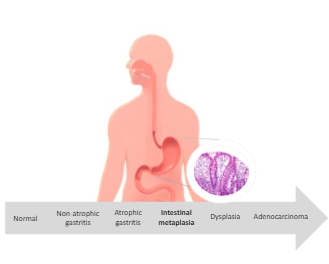Overview
The burden of gastric (stomach) cancer is unevenly distributed, with several Asian and Latin American countries having particularly high incidence rates. In the United States, minoritized populations, including Asian and Latino/Hispanic individuals, have an increased risk of developing and dying from gastric cancer as compared to non-Hispanic White individuals. There is no standard or routine screening for gastric cancer in the United States.
Studies of premalignant lesions may provide insights into cancer etiology and inform risk stratification. The Gastric Cancer Precursor Lesions (GCPL) Study is a multidisciplinary project to evaluate risk factors for intestinal metaplasia, a precancerous change of the mucosa of the stomach with intestinal epithelium, that confers an increased risk of gastric cancer. Patients with intestinal metaplasia may benefit from endoscopic surveillance to anticipate cancer diagnosis in an earlier stage. Therefore, we evaluate potential noninvasive screening markers. Better understanding of gastric cancer etiology may inform future efforts for prevention and control in the United States and globally.
See all DCEG research on gastric cancer and infectious agents.
Study Team
Lead Investigator
Constanza Camargo, Ph.D., Earl Stadtman Investigator, Metabolic Epidemiology Branch (MEB)
DCEG Collaborators
- Christian Abnet, Ph.D., M.P.H., senior investigator and Branch Director, MEB
- Mitchell H. Gail, M.D., Ph.D., senior investigator, Biostatistics Branch
- Emily Vogtmann, Ph.D. M.P.H., Earl Stadtman Investigator, MEB
Collaborating Institutions in Chile
Background & Purpose
Since burden of gastric cancer is unevenly distributed, with Asian and Latin American countries having particularly high incidence rates, we located this case-control study in Chile in partnership with leading universities and hospitals that treat patients from high-incidence regions.
Study Highlights
Enrollment: 2017 - 2020
Participants: 600 intestinal metaplasia cases, non-atrophic gastritis 600 controls
Age range: 40 - 70 years; males and females
Read More: See all DCEG research on gastric cancer and infectious agents.
The GCPL study evaluates risk factors that have been insufficiently studied, such as various hormones, Helicobacter pylori genomics, non-H. pylori gastric microbiota, and parasitic infections. We also evaluate potential noninvasive screening markers, including pepsinogens, digestive hormones, and polygenic risk scores. Results from this case-control study may lead to improved management recommendations for individuals with advanced intestinal metaplasia. Additionally, the resulting biobank will enable state-of-the-art molecular assays and serve as a resource for future research in this area.
Study Design
The GCPL study recruited Chilean adult individuals residing in high-risk areas. Participants completed a questionnaire about their health, shared access to their medical records, and donated biological materials (i.e., stomach tissue samples, blood, saliva, urine, and stool).
We conducted a three-year case-control study of Chilean adults undergoing upper gastrointestinal endoscopy for clinical purposes to identify ~600 individuals with advanced intestinal metaplasia for informative comparisons with ~600 controls with non-atrophic gastritis, a benign histologic change apparent in most H. pylori-infected individuals. As an additional case group, ~100 individuals with newly diagnosed gastric cancer were recruited from the same clinics.
Data Sharing
Whenever possible, data collected and/or generated from the GCPL study will be made available for secondary research purposes.

